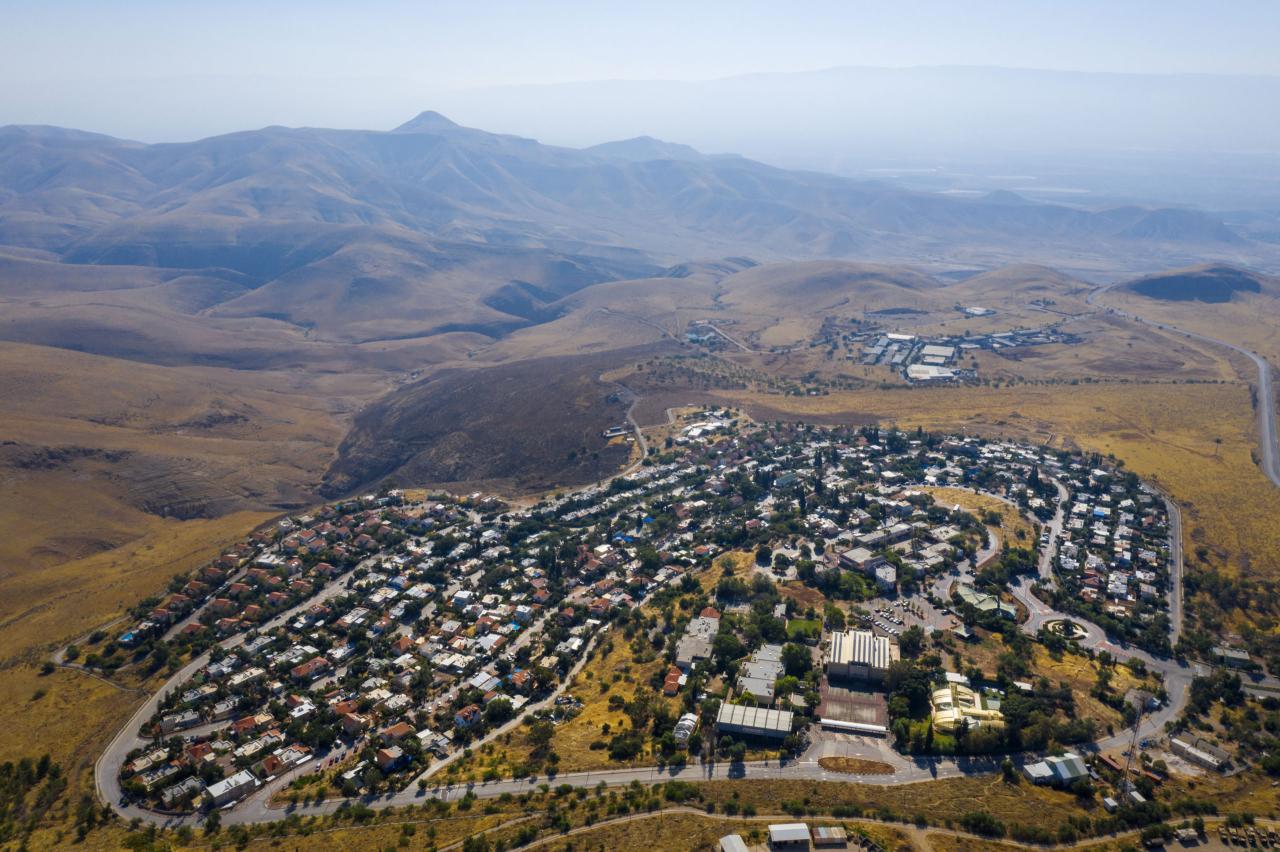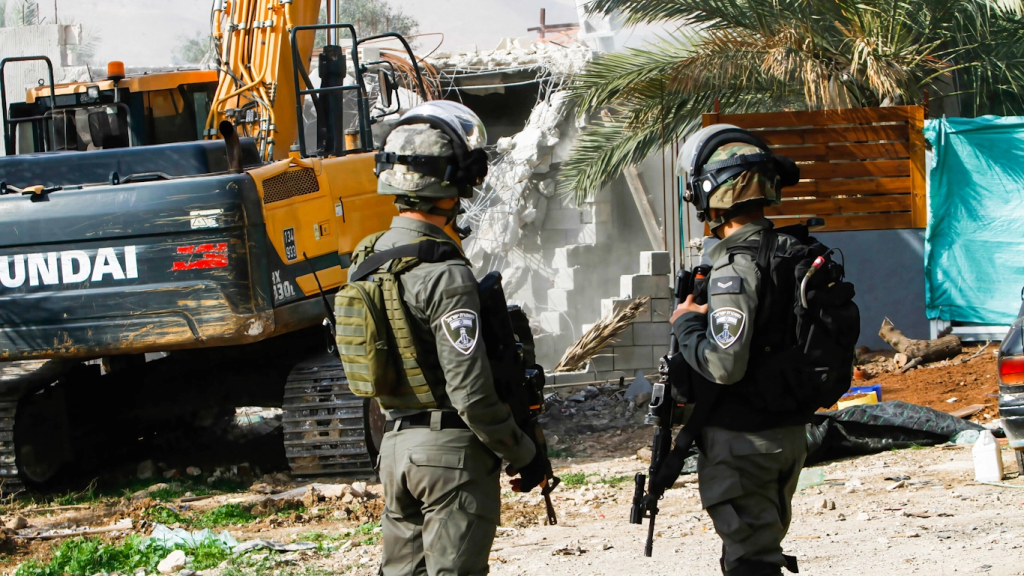FEBRUARY 8TH, 2023
Before being re-elected in 2019, Israeli Prime Minister Benjamin Netanyahu vowed to annex the Jordan Valley, which makes up approximately 30% of the occupied West Bank, if he remained in power. After months of speculation, Netanyahu nixed his promise in the summer of 2020 as part of Israel’s normalization agreement with the United Arab Emirates.
Yet with Netanyahu back in office again and leading a right-wing extremist coalition, annexation of the Jordan Valley is back on the agenda.
In January, Israeli member of parliament, Danny Danon, announced his plans to put forward a bill to annex the region. According to Jewish News, the bill he is preparing seeks to apply “Israeli law to all areas of the Jordan Valley,” including the “industrial areas that serve them, the archaeological sites in the area and the access roads to these areas.”
Additionally, settler-colonists with the Sovereignty Youth Movement have collected more than 1,000 signatures for a petition demanding the government annex the Jordan Valley. While the Sovereignty Youth Movement and Danon did not respond to MintPress News’ requests for comment, Danon told Jewish News:
The annexation of the Jordan Valley is a significant issue for Israel from an historical, economical as well as crucially, from a security perspective. We know that there is support for the application of Israel’s sovereignty of the Jordan Valley, both in the government’s coalition as well as in the opposition.”
Rabbi Arik Ascherman, an activist and director of Israeli non-profit Torat Tzedek, explained that Israeli proposals to annex the Jordan Valley were not exclusively dominated by the right. Rather, Israelis across the political spectrum largely agree on annexing the Jordan Valley for security purposes.
Settlement construction in the Jordan Valley was initially the brainchild of Israel’s Labor Party brought forth by Labor Minister Yigal Allon as part of the Allon Plan, a draft partition agreement following Israel’s capture of the West Bank and East Jerusalem in 1967. Establishing settlements in the Jordan Valley was seen as a strategic move to defend against then-existing threats from the east. Today, while those threats have disappeared, the argument of security still persists.
THE JORDAN VALLEY’S IMPORTANCE
Being in the Jordan Valley is like hiking through a landscape painting. Jagged cliffs soften into plateaus. Mountains transform into sandy waterfalls and eventually descend into lush ravines. The area is coveted for its natural beauty and agricultural capability. The mineral-rich soil, unique climate, and plentiful water resources has made it a hotspot for farming year-round and therefore an economic necessity.
“It’s a very rich area, not just for agribusiness, but even for tourism and enjoying nature,” Rashed Khudairy, Coordinator of the Jordan Valley Solidarity Campaign and resident, told MintPress News.
But in between the flocks of grazing sheep, jumping gazelles, and banana plantations, there are remnants of past lives. On a muddy hilltop, a family home lays in ruins. A lone shoe left on stone floors whose walls have been dismantled serves as just a wisp of a memory. Facing constant violence, families in the Jordan Valley often leave their land of their own accord.
“The settlers just came and they tore down the shepherd’s structures and threatened him with knives,” Ascherman said, referring to a Palestinian shepherd who fled his land after harassment from nearby settlers. In other cases, shepherds plowed their fields but never returned to harvest out of fear of settler attacks.
Construction of outposts – extensions of Israeli settlements built without the government’s approval – began in 2013 in the Jordan Valley, but sharply increased from 2016. While settlements are legal under Israeli law, outposts are not. Both are illegal under international law.


There are 20 outposts in the Jordan Valley, according to 2020 data from settlement watchdog, Peace Now. Unlike the first Labor Party settlements, Ascherman explained, these colonies are often made up of violent radicals.
“What’s changed in the last seven years or so has been the influx of all the outposts, which are much more ideological, much more aggressive, much more likely to be violent, much more committed to driving out the Palestinians than some of the veteran settlements were,” Ascherman said. And as the settlements expand, the violence increases. Last February, a new outpost, known as Moshe’s Farm, was established.
A female shepherd, who spoke to MintPress News under condition of anonymity, lives near Moshe’s Farm and explained that the settlement development has significantly impacted the community’s ability to graze their livestock. “They’re suffocating us, because we used to go far in that direction,” she said, pointing toward the mountains. “And now it’s limited because of the new outpost.”
Many of the Bedouin shepherds MintPress News spoke to wished to remain anonymous, given that speaking out may cause the Israeli government to take punitive action against them. “Whenever settlers see us with the sheep, they chase us or they chase the sheep with their tractors, in order to push us further back,” She said. “So this is why many people here have been selling their sheep.”
Lost wages and looming poverty has become the norm in the Jordan Valley, with more and more shepherds selling their livestock.
Ascherman explained that a lack of grazing area has pushed shepherds to rely on store-bought feed instead, thereby reducing their income. “[Shepherding] can become no longer economically viable,” Ascherman said. “And we know shepherds who have just sold their flock and moved into the cities, which is just what Israel would like to see happen.”
ANNEXATION: ON THE HORIZON OR ALREADY HERE?
Proposed annexation of the Jordan Valley would turn the West Bank into Swiss cheese and erode any possibility of a contiguous Palestinian state there. What a takeover of the valley would look like remains unclear, but the understanding is that rural land would be annexed while major cities like Jericho would fall under control of the Palestinian Authority.
“The very real Israeli policy is not only to try to eventually annex the Jordan Valley, but to clear Palestinians out as much as possible from Area C, which comprises 60% of the occupied West Bank and has fewer Palestinians to begin with, and concentrate them in the urban areas,” Ashcerman said.
Some shepherds in the Jordan Valley fear official Israeli annexation may lead to mass demolitions. Nearly every structure in the Jordan Valley has been served a demolition or stop-work order. Yet these demolitions have not been executed thanks to lawyers’ efforts in receiving temporary injunctions to halt demolitions.
Along with demolition concerns, shepherds have also noticed an uptick in settler violence since December, when Netanyahu formed a coalition government consisting of outspokenly racist politicians. “Settlers have come with their sheep even closer to where we live,” a shepherd who wished to remain anonymous said. “My friend’s car broke down and settlers came and attacked him.”
Throughout the Jordan Valley, settlers and the army work in tandem together to create an unlivable environment for Palestinians. The army has designated large swathes of land as military training zones, served demolition orders, and ignored Palestinian complaints regarding settler violence, while settlers harass, tear down structures, and prevent Palestinians from grazing or harvesting.
Khudairy explained that the army often works at the direction of the settlers. And this military-settler collaboration is really where annexation is manifesting. “Since Netanyahu mentioned they were going to annex the Jordan Valley, settler municipalities and councils started doing the work on the ground,” Khudairy said. “They come with Israeli soldiers to confiscate cars and tractors.”
The majority of Palestinians and solidarity activists in the Jordan Valley are unaware of what the future may hold. But whether annexation is imminent or not, for most, the Jordan Valley is already de facto annexed.
Feature photo | Israeli soldiers guard equipment against the Palestinians as their home is demolished in the northern Jordan Valley in the occupied West Bank. Nasser Ishtayeh | Sipa via AP Images
Jessica Buxbaum is a Jerusalem-based journalist for MintPress News covering Palestine, Israel, and Syria. Her work has been featured in Middle East Eye, The New Arab and Gulf News.
Filed under: “Israel”, Palestine, Palestinians | Tagged: Home demolition, Isael’s Annexation of the West Bank, Israeli Expansion, Jordan River Valley, Netanyahu, Occupied Alquds, Occupied W Bank, Palestinian youth generation, Settlements and settlers, Settlers Attacks |
Related posts:
Views: 0
 RSS Feed
RSS Feed
















 February 9th, 2023
February 9th, 2023  Awake Goy
Awake Goy 

 Posted in
Posted in  Tags:
Tags: 
















